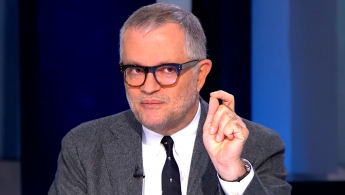Pro-Saudi Washington-based think tank Arabia Foundation abruptly finishes operations
The Arabia Foundation is a think-tank founded by Saudi national Ali Shihabi, a former banker and novelist who has been dubbed as Riyadh's "unofficial" ambassador to the US, according to Politico.
Shihabi announced the decision to shut down the foundation, which was launched in 2017, on Twitter on Tuesday.
"It is with regret that I confirm that the board of directors of the Arabia Foundation decided today to close down the foundation," he tweeted.
"This is due to ongoing differences among our donors that made continued operations difficult.
Shihabi, who has lauded many of the policies of controversial Crown Prince Mohammed bin Salman, said he continues to support the Saudi leadership.
"This in no way changes any of my opinions, particularly my support for the programme of change and reform that Crown Prince Mohammed bin Salman is spearheading," he added.
No further information was provided surrounding the reason for the decision to close the foundation.
Riyadh has faced widespread criticism for the murder of Saudi journalist Jamal Khashoggi who was killed inside the kingdom's consulate in Istanbul last October.
Saudi Arabia has also been criticised for other serious human rights abuses, including airstrikes against civilian targets in Yemen and widespread executions.
Opposition to Saudi Crown Prince Mohammed bin Salman's clampwdown on dissent and war in Yemen has become more widespread in US Congress.
The US Senate Foreign Relations Committee announced on Thursday its support for imposing sanctions on the Saudi royal family, as well as for curbing weapons sales.
This was seen as a show of opposition to President Donald Trump's cosy relations with the Gulf kingdom.
The panel voted 13-9 in favour of legislation that would impose sanctions and cuts to arms sales. Those in support consisted of the committee's Democrats and three Republican members who went against the president.
However, the US Senate failed to prevent the controversial sale of $8.1 billion in weapons to Saudi Arabia, after President Donald Trump vetoed congressional resolutions blocking the deal.
The bill called for a "comprehensive review" of Washington's relationship with Saudi Arabia, Reuters reported.
It also called on Trump to deny visas to Saudi citizens tied to rights abuses, allowing waivers in cases of national interest.
The move was the latest effort by lawmakers to draw attention to Saudi Arabia's human rights violations.
Crown Prince Mohammed sparked hopes of major social and economic reform when he was elevated to his position in 2017.
However, his reputation has been badly damaged by the murder of dissident writer Khashoggi.
Agnes Callamard, a UN special rapporteur on extrajudicial executions, reported "credible evidence" in June that linked him to the killing of Khashoggi, who was strangled and dismembered inside the Saudi consulate in Istanbul.
Earlier this month, Callamard, who concluded that Khashoggi's death at the Saudi consulate in Istanbul in October was "an extrajudicial execution" by the Gulf kingdom, criticised the United States over its inaction.
"(It) has the jurisdiction or at least the interest to take action," she told a London conference hosted by human rights groups on the killing of the Saudi-born US resident.
"Silence is not an option. Speaking up is required but not enough. We have to act," Callamard said.
The UN rapporteur on extrajudicial, summary or arbitrary executions said Washington could act "either through an FBI investigation (or) a civil law investigation... (or) the declassification of CIA and other materials".
"All of those things I believe can be done and should be done."
Follow us on Twitter: @The_NewArab





 Follow the Middle East's top stories in English at The New Arab on Google News
Follow the Middle East's top stories in English at The New Arab on Google News
![Netanyahu furiously denounced the ICC [Getty]](/sites/default/files/styles/image_330x185/public/2024-11/GettyImages-2169352575.jpg?h=199d8c1f&itok=-vRiruf5)
![Both Hamas and the Palestinian Authority welcomed the ICC arrest warrants [Getty]](/sites/default/files/styles/image_330x185/public/2024-11/GettyImages-2178351173.jpg?h=199d8c1f&itok=TV858iVg)
